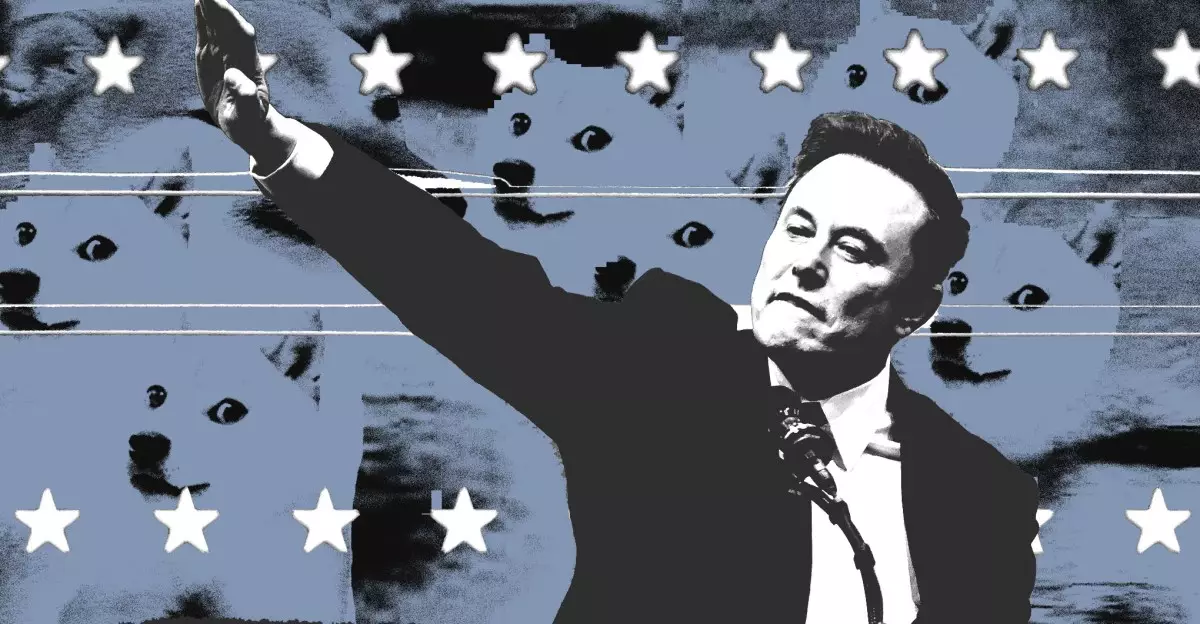In recent months, the political landscape has been marred by alarming developments involving figures from the Department of Government Efficiency (DOGE). A noteworthy case is Marko Elez, a 25-year-old staffer who recently resigned from a significant government role following revelations about his troubling online activity. Elez maintained an account that espoused extreme views, including a call for a “eugenic immigration policy” and the repeal of the Civil Rights Act. This incident serves as a poignant example of how fringe ideologies are permeating mainstream political discourse and the ramifications this can have on the quality of governance.
Elez’s story began to unfold when the Wall Street Journal investigated his social media presence, exposing posts that reveal a dangerous worldview rooted in racism and anti-immigrant sentiments. One particularly alarming tweet suggested that the majority of Indian H-1B visa holders would soon be replaced by “slightly smarter” AI, an assertion that reflects a broader, dismissive attitude towards foreign professionals. Such statements do not merely represent personal beliefs; they indicate an ingrained ideology that threatens the diversity and collaboration crucial to a productive workplace, especially in sectors dependent on international talent.
The concept of “groyperfication,” as described by writer John Ganz, illustrates how young conservatives are increasingly influenced by an online subculture that celebrates extreme right-wing beliefs. This shift poses significant threats to democratic ideals and principled governance, blurring the boundaries between acceptable political discourse and dangerous extremist rhetoric.
The DOGE initiative, headed by Elon Musk’s vision of a streamlined and radically restructured federal government, has focused on dismantling programs aimed at promoting diversity, equity, and inclusion. As Elez’s resignation points to a troubling trend, it raises broader questions about the intent behind such movements. The termination of funding for agencies like USAID and NOAA, labeled as “woke,” is emblematic of an administration attempting to discard the principles of inclusive governance.
Elez’s involvement in DOGE was particularly troubling given his direct access to sensitive government systems at the Treasury Department. His position symbolized a worrying intersection of technological oversight and ideological extremism. The implications of allowing figures with such radical views access to governmental powers are staggering, as it introduces a level of bias into decision-making processes that should be apolitical and focused on public welfare.
Elez’s resignation, although severe, is not an isolated incident. The Biden administration is experiencing its own controversies, particularly with the recent hiring of Darren Beattie, a former Trump speechwriter whose past associations with white nationalist groups have drawn scrutiny. Beattie has been vocal in promoting anti-DEI sentiments and has criticized societal structures that support diversity. The juxtaposition of these two figures highlights a critical concern: both administrations are experiencing internal conflicts regarding personnel who espouse extremist views.
This landscape echoes a broader trend where debates about diversity, civil rights, and governance are increasingly intertwined with extremist ideologies, potentially normalizing radical views that had once been relegated to the fringes. The normalization of such factors poses a direct threat to the integrity of democratic institutions.
To counteract the dangers posed by individuals like Elez and Beattie, it is essential for political leaders, both in and out of government, to uphold the values of inclusivity and equality. A concerted effort to educate the public on the importance of rejecting extremist ideologies is needed, fostering a societal norm that champions diversity as a strength rather than a vulnerability.
Moreover, there must be stringent oversight and accountability in hiring practices, ensuring that individuals with a history of promoting extremist views have no place in public service. This will help to safeguard democratic values and the integrity of governmental institutions from the toxic influence of radical ideologies.
The rise of toxic ideologies within political circles signals a disconcerting trend that demands immediate attention and action. The stories of Marko Elez and Darren Beattie illuminate a pressing need for a collective re-evaluation of the values that underpin governance. As society grapples with these alarming developments, the commitment to inclusion and the rejection of eugenic and racist policies must remain a priority to preserve the democratic fabric of the nation.


Leave a Reply
You must be logged in to post a comment.